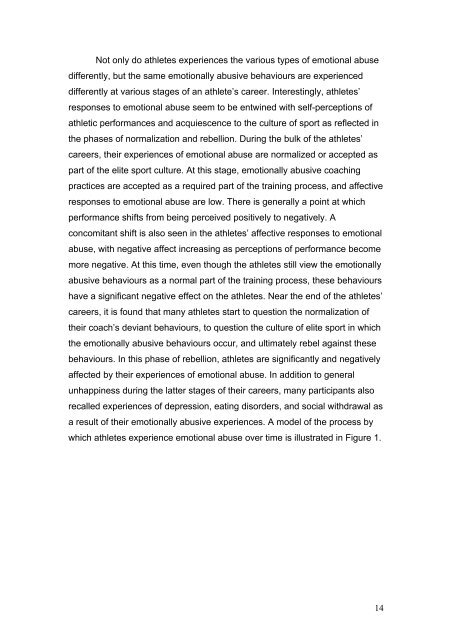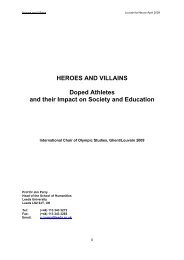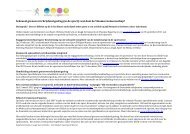Part 3 GLOBAL ISSUES: HARASSMENT AND ABUSE RESEARCH
Part 3 GLOBAL ISSUES: HARASSMENT AND ABUSE RESEARCH
Part 3 GLOBAL ISSUES: HARASSMENT AND ABUSE RESEARCH
Create successful ePaper yourself
Turn your PDF publications into a flip-book with our unique Google optimized e-Paper software.
Not only do athletes experiences the various types of emotional abuse<br />
differently, but the same emotionally abusive behaviours are experienced<br />
differently at various stages of an athlete’s career. Interestingly, athletes’<br />
responses to emotional abuse seem to be entwined with self-perceptions of<br />
athletic performances and acquiescence to the culture of sport as reflected in<br />
the phases of normalization and rebellion. During the bulk of the athletes’<br />
careers, their experiences of emotional abuse are normalized or accepted as<br />
part of the elite sport culture. At this stage, emotionally abusive coaching<br />
practices are accepted as a required part of the training process, and affective<br />
responses to emotional abuse are low. There is generally a point at which<br />
performance shifts from being perceived positively to negatively. A<br />
concomitant shift is also seen in the athletes’ affective responses to emotional<br />
abuse, with negative affect increasing as perceptions of performance become<br />
more negative. At this time, even though the athletes still view the emotionally<br />
abusive behaviours as a normal part of the training process, these behaviours<br />
have a significant negative effect on the athletes. Near the end of the athletes’<br />
careers, it is found that many athletes start to question the normalization of<br />
their coach’s deviant behaviours, to question the culture of elite sport in which<br />
the emotionally abusive behaviours occur, and ultimately rebel against these<br />
behaviours. In this phase of rebellion, athletes are significantly and negatively<br />
affected by their experiences of emotional abuse. In addition to general<br />
unhappiness during the latter stages of their careers, many participants also<br />
recalled experiences of depression, eating disorders, and social withdrawal as<br />
a result of their emotionally abusive experiences. A model of the process by<br />
which athletes experience emotional abuse over time is illustrated in Figure 1.<br />
14
















